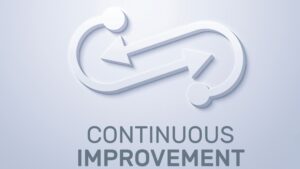Think of modern industries as a complex puzzle. The key to solving that puzzle and achieving success is the way things are made – the manufacturing process. This crucial process takes raw materials and transforms them into finished products, forming the heart of industries all around the world. How well this process works has a huge impact – it affects the quality of what’s made, how much gets done, and even how sustainable the whole operation is.
In this article, we’re going to really dive into the world of making things, exploring why it matters so much in today’s industry. We’re zooming in on the special connection between making things efficiently and using high-tech tools like Enterprise Resource Planning (ERP) systems. These digital wonders are like the superheroes of business software, helping everything run smoother and changing the way industries make things better.
On our journey, we’re shining a light on how important manufacturing process is. They’re not just about getting things done, but also about making them top-notch and always finding ways to do even better. We’re also going to take a closer look at ERP systems – the behind-the-scenes tech that links different parts of a business together, making sure information flows well and decisions are smart.
Imagine a bridge between two super important things – how things are made and the smart software that makes it all work like magic. This bridge doesn’t follow the old rules; it goes beyond them. ERP systems help manufacturing become more like a well-choreographed dance, going from clunky steps to a graceful performance. They also bring in real-time information that helps businesses keep getting better and better.
So, let’s explore this landscape together. We’re going to find out how ERP systems are like shining stars, lighting up the way to making things smart, reducing waste, and finally, getting things so well organized that industries shine bright. The connection between knowing how to make things and knowing how to use clever technology is the key to a future where industries don’t just survive – they thrive, no matter what challenges come their way.
Understanding the Manufacturing Process
When we talk about the manufacturing process, we’re referring to the way things are created – from raw materials to finished products. This process is like the beating heart of any industry. It’s not just about making things; it’s about making them in the best way possible.
The manufacturing process is a big deal because it affects a lot of important things. First off, it’s the key to making sure things run smoothly and efficiently. That means getting the most out of every resource and making sure everything works like a well-oiled machine.
Quality is another big part of it. The way things are made directly impacts how good they are. Whether it’s a car, a gadget, or a piece of clothing, a solid manufacturing process ensures that the end product is up to scratch.
But it doesn’t stop there. This process is all about learning and growing too.
Continuous improvement is a big buzzword here. It means always finding ways to do things better, faster, and smarter. The more a manufacturing process improves, the more the whole industry benefits.
Now, let’s talk about optimisation. When a manufacturing process is optimised, it’s like giving it a power boost. Optimised processes are super efficient. They get things done quickly and with fewer mistakes. This has a knock-on effect on productivity – more things can be made in less time.
Plus, optimisation also helps cut down on waste. When things are done just right, there’s less stuff that goes to waste, whether it’s materials, time, or energy.
So, the manufacturing process isn’t just a behind-the-scenes thing. It’s the engine that drives industries forward. From how things are put together to how they turn out, it’s a critical part of making sure industries work like a well-tuned orchestra.
The Role of ERP Solutions in Optimising Manufacturing Processes
When it comes to optimising manufacturing processes, one super important player in the game is ERP – that stands for Enterprise Resource Planning. These are like the brainy systems that help businesses keep everything in check and working smoothly.
Now, what exactly is ERP? Well, imagine it as a super-smart manager. It takes care of lots of different tasks, making sure they all fit together like pieces of a puzzle. It brings together various business functions, from keeping track of inventory to managing finances, and even handling customer orders.
But how does ERP make manufacturing processes even better? Imagine a hub where all the important information hangs out. That’s what ERP systems do. They gather data from different parts of a business and put it in one place. This is like having all the puzzle pieces in front of you so you can see the whole picture.
Because of this, communication gets a major boost. Everyone involved in the manufacturing process can easily access the same information. That means no more confusion or mixed-up messages. Everyone’s on the same page, working together smoothly.
And let’s not forget about decision-making. With ERP, making smart choices becomes a piece of cake. When you have all the data in one place, you can quickly figure out what’s going well and what needs a bit of a nudge. It’s like having a crystal ball that helps you see into the future of your business operations.
So, in a nutshell, ERP systems are like the superheroes of the manufacturing world. They gather all the important bits and pieces, make sure everyone’s in sync, and help businesses make smart moves. It’s all about streamlining things, so the manufacturing process goes from good to great.
Facilitating Process Mapping with ERP

When it comes to getting a clear picture of how things work in manufacturing, ERP systems are like the ultimate tour guides. They help us map out the entire journey from start to finish, so we can see exactly how things are done.
Imagine having a treasure map that shows you all the steps in making a product. That’s what ERP does. It visualises the whole process, making it easy to understand and follow along. This is important because it helps everyone involved know exactly what they’re doing and where they fit in.
But that’s not all – clear process mapping comes with some really business benefits. One of the big ones is spotting the hiccups in the process. These hiccups are called bottlenecks. They’re like traffic jams in the production line. With ERP, you can identify these bottlenecks easily. Once you know where they are, you can work on fixing them, making sure everything runs smoothly.
And speaking of smooth, process mapping helps us find the bumps in the road. These are redundancies – doing the same thing more than once. ERP systems are like detectives that uncover these duplications. Getting rid of them means things get done faster and with less effort.
But the best part? Process mapping is like a treasure hunt for improvement. When you can see the whole journey, you can find the spots where things could be done better. It’s like finding hidden gems. ERP systems help businesses figure out which areas need a little polish and make the whole process shine.
So, when it comes to visualising and mapping out manufacturing workflows, ERP systems are like X-ray glasses that reveal the secrets to making things awesome. From finding roadblocks to discovering new ways of doing things, ERP takes the manufacturing process from a confusing maze to a clear and exciting adventure.
Enabling Continuous Improvement through ERP

Imagine having a magical crystal ball that shows you exactly how your manufacturing process is doing at any moment. Well, that’s what ERP solutions bring to the table – real-time data insights that help things get better and better.
Think of it like having a dashboard that displays all the important numbers and stats in front of you. With ERP, you don’t have to wait for reports to be generated – you can see what’s happening right now. This is a big deal because it means you can spot any hiccups or slowdowns immediately. When you know what’s not working, you can fix it right away.
But the real magic comes from data-driven decision-making. ERP is like a super-smart advisor that gives you advice based on facts and figures. You’re not just guessing – you’re making choices that have a solid foundation. When you see the numbers, you can figure out what’s going well and what could use a bit of a boost.
And here’s where the cool part comes in. All this data and insight leads to something called continuous improvement. It’s like a never-ending journey of making things better. With ERP, you’re not stuck with one way of doing things. Instead, you’re always looking for ways to enhance the process.
So, picture this: ERP solutions are like having a superhero sidekick that helps you keep an eye on the manufacturing process. They bring you real-time updates and facts that help you make smarter decisions. And with those decisions, you’re on a path of constant improvement, turning an already good process into something truly outstanding. It’s like having a secret recipe for success that keeps getting tastier with every batch.
Pursuit of Operational Excellence via ERP

Imagine a company that runs like a well-tuned machine – every part working smoothly, every task streamlined, and every goal achieved. That’s what operational excellence is all about, and ERP solutions play a major role in making it happen.
Operational excellence is like the gold standard of business success. It’s not just about doing things okay; it’s about doing them amazingly well. And guess what? Optimised manufacturing processes are the secret ingredient. When you fine-tune how things are made, you automatically move closer to operational excellence.
Why? Because an optimised process means fewer errors, faster production, and less waste. It’s like turning a regular car into a supercharged race car.
Let’s look at some real-life examples. Think about a car manufacturer that uses an ERP system. They can track every step of the production process, from ordering parts to assembling the final vehicle.
This means they can quickly spot any issues and fix them before they become big problems. With ERP, they can even predict when parts will run low and order more in advance. This keeps the production line running smoothly and customers happy.
Or take a clothing company that uses ERP to manage their supply chain. They can see how much fabric they have, how many items are being made, and even when orders are shipped. With this clear view, they can adjust their production to meet demand.
This means they’re not making too much or too little – it’s just right. And that’s a huge win for operational excellence.
So, in a nutshell, ERP solutions are like the secret sauce that makes operational excellence a reality. They turn regular processes into extraordinary ones, helping companies run smoother, faster, and smarter. And with real-world examples of companies doing just that, it’s clear that ERP isn’t just a tool; it’s the key to making businesses shine.
Anticipating Future Trends and Considerations

Ever wondered what the future holds for the way industries work? Well, when it comes to the manufacturing process, there are some exciting trends on the horizon – and ERP technology is leading the way.
Picture this: technology that’s always evolving. That’s ERP for you. As time goes on, these systems are getting smarter and more powerful. They’re like the superheroes of the manufacturing world, helping businesses create products with fewer hiccups and more efficiency.
One big trend is the use of artificial intelligence (AI) and machine learning. These are like the brainy sidekicks of ERP. They can predict when machines need maintenance, suggest ways to improve processes, and even analyse data to find patterns that humans might miss.
With AI and ERP working together, the manufacturing process becomes a high-tech masterpiece.
But with these advancements come some things to consider. Imagine a company deciding to implement or upgrade an ERP system. It’s like giving the business a digital makeover. But just like any makeover, it needs careful planning.
Businesses have to think about how the new system fits in with their current processes, how employees will be trained to use it, and what kind of data security measures need to be in place.
And speaking of employees, change can sometimes be challenging. When a new system comes in, people might feel unsure about it. That’s why getting buy-in from everyone involved is important. Businesses need to show how the ERP system will make their jobs easier and the manufacturing process better.
So, the future of manufacturing processes is looking bright with ERP technology leading the way.
With AI and machine learning as allies, the manufacturing process becomes smarter and more efficient. But with these exciting changes come considerations – from planning the implementation to ensuring everyone’s on board. It’s like preparing for a journey to a more high-tech, efficient, and exciting future.
In the intricate tapestry of modern industry, the manufacturing process stands as the linchpin of success. This essential process shapes raw materials into finished goods, with its efficiency echoing across the realms of quality, productivity, and sustainability. We’ve embarked on a journey through the heart of manufacturing processes, unveiling their profound impact on industries worldwide.
The symbiotic dance between manufacturing prowess and ERP solutions, those digital orchestrators of business functions, has been the focal point of our exploration. From visualising workflows to real-time data insights, ERP systems elevate manufacturing process to new heights. Clear process mapping, bottlenecks identification, and waste reduction are no longer distant dreams but achievable goals through ERP-driven innovation.
Operational excellence, the zenith of industry achievement, beckons to us through the corridors of optimised manufacturing process. The tales of companies using ERP solutions to streamline their operations are a testament to the transformative power of this alliance.
As we draw our journey to a close, one resounding truth echoes – the manufacturing process is not merely a component; it’s the heartbeat of industry evolution. We invite you to contact us to embrace the capabilities of ERP solutions, not merely as tools but as partners in achieving efficient process mapping, continuous improvement, waste reduction, and the coveted pinnacle of operational excellence.
Contact us today to shape the future of manufacturing. Unlock the power of ERP solutions and forge a path towards industry brilliance. The journey to excellence begins with a single step – harness the synergy between innovation and manufacturing, and watch your business thrive.
Stay up-to-date with the latest industry trends and SAP news by following us on LinkedIn! Connect with our community of professionals and gain valuable insights into the ever-evolving world of business and technology. Don’t miss out on exclusive content, thought leadership articles, and exciting updates. Join us on LinkedIn today and take your industry knowledge to new heights!